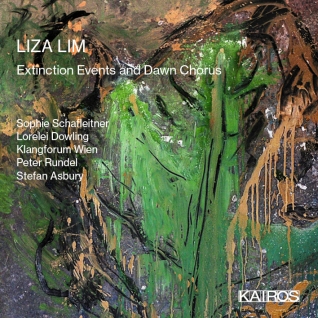Totally contemporary, this new CD by Australian composer Liza Lim (1966) recently released on Kairos. Automatically listen to Extinction Events and Dawn Chorus in the context of the corona pandemic. Are we heading for total collapse?
The ominous title refers to Lim's concern about the huge amounts of plastic choking the oceans. The fish that eat this waste that is disintegrating into ever-smaller particles are threatened with extinction. - And ultimately life on earth itself.
It is just one of the many plagues of our time. Devastating forest fires in Australia are barely under control; immense swarms of locusts are swallowing crops in East Africa; large parts of the world will be flooded by melting icebergs. At the same time, fresh water is becoming increasingly scarce due to successive droughts. The Netherlands is already facing a severe shortage of rain. And it is barely mid-May.
In her notes to Extincton Events and Dawn Chorus for 12 musicians refers Lim to philosopher Timothy Morton. Our insatiable materialism and consumerism come at the expense of a habitable planet. Therefore, we need to recalibrate our understanding of nature. Morton coined the term 'hyperobjects' for phenomena so large that we can only know them by their effects, such as climate change and mass extinction. In this regard, Lim writes that we need to rethink 'what is and what counts as knowledge'.
Plastic waste
Extincton Events and Dawn Chorus is, at forty minutes, one of Lim's most substantial instrumental works to date. In five movements, she presents a musical equivalent of the clutter sloshing around in our oceans. She translates the resulting maelstroms into loops (recurring patterns) and rotating motifs. In doing so, she makes frequent use of the haunting sound of the rumble pot or stir drum. This is an earthenware vessel strung with a sheet through which a stick is inserted. As the player spins it around, the friction produces a groaning sound.
 Lim treats us to a sound universe all his own, with a sampling of unusual playing styles. Glissandi, microtones, sudden register changes, slap tongue (popping tone of a reed instrument), with lots of air-produced sounds and multiphonics ('impure' multiple sounds).
Lim treats us to a sound universe all his own, with a sampling of unusual playing styles. Glissandi, microtones, sudden register changes, slap tongue (popping tone of a reed instrument), with lots of air-produced sounds and multiphonics ('impure' multiple sounds).
In the first movement, 'Anthropogenic Debris', the recorded cries of the extinct Kauaua'i bird simultaneously create an atmosphere of nostalgia and doom. In contrast, the fourth movement 'Transmission' is almost joyful. In a duet between violinist and percussionist, the latter tries to 'imitate' the former's musical material on a rudimentary string drum.
In the concluding 'Dawn Chorus', Lim sketches a mysterious world full of sonorous swirls of mustachioed bones against which the horns place hesitant, kazoo-like tones. The percussionists produce rattling and clicking sounds as of falling sticks. The trombone plays short low notes, the other brass instruments form a chorale from sustained chords.
The piece ends with the unearthly sound of a contrabassoon extended with a long plastic tube. When its tone dips below our hearing threshold, the music dies away into nothingness. Thus Lim almost tangibly depicts the impending extinction of coral fish singing a 'dawn chorus' in the morning.
Indigenous traditions
Lim composed Axis Mundi in close collaboration with bassoonist Alban Wesly of the German ensemble Musikfabrik. The title refers to Yggdrasil, the cosmic tree of Norse mythology that connects heaven and earth and to the 'world tree' in Siberian shamanism that acts as a ladder between the lower, middle and upper worlds. The musical material tirelessly traverses all registers in a multitude of extended techniques. From Flatterzunge to multiphonics, glissandi and double tones. Lorelei Dowling of Klangforum Wien plays her virtuoso part with admirable precision.
Songs Found in Dream is inspired by Aboriginal culture, in which 'songlines' play an important role. Lim took the concept of 'shimmer' as a starting point here. This refers to an aesthetic-spiritual principle where patterns of painted dots symbolise the power of ancestral spirits. Lim translated this into short motifs that clump together into intricate, turbulent swirls.
Sustained sounds are interspersed with high-pitched cries. Junk pots, rain sticks, rattles and wooden drums recall Aboriginal percussion instruments. The piece ends abruptly, perhaps as a warning that Aboriginal traditions too are about to disappear forever.
On this CD, Liza Lim addresses important themes. Her flair for creating unheard sounds leads to disturbing music. It gets under your skin and asks questions of conscience. Klangforum Wien and conductors Peter Rundel and Stefan Asbury are the ideal interpreters of this unique sound universe.
But whether we will take Lim's message to heart? I fear the worst, with our government subsidising air travel by billions and leaving the arts dangling. While it is precisely artists like Lim who can point us in a different direction.
